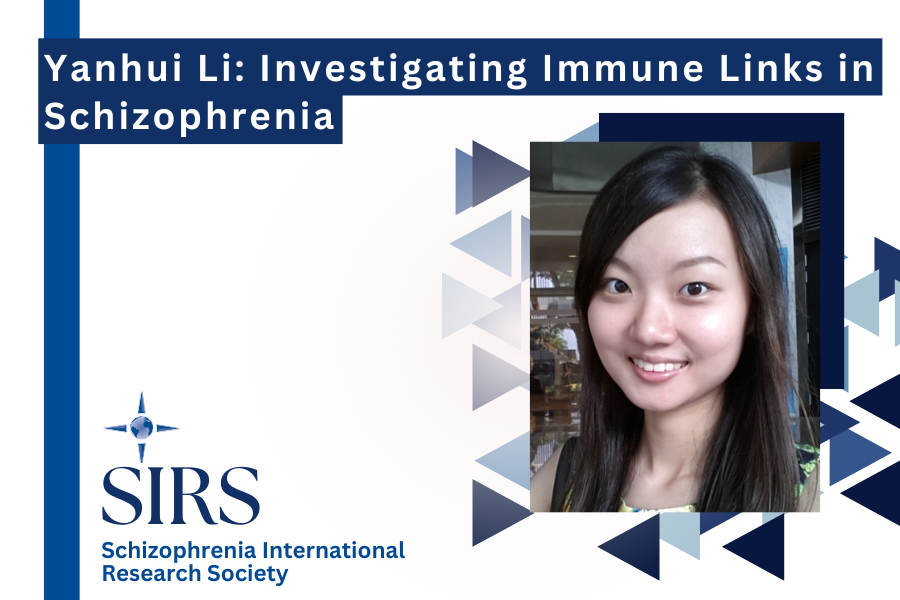Yanhui Li, B.Sc., M.D.
Psychiatry Resident
Institute of Mental Health, Singapore
I am a Psychiatry resident at the Institute of Mental Health in Singapore and my work focuses on investigating immunological changes in schizophrenia and treatment resistance. We have recently performed one of the most ambitious and comprehensive immunophenotyping study on schizophrenia patients and healthy individuals, and identified immune cells significantly different between them. We specifically identified an immune cell ratio (the CD4/CD8 T cell ratio) as a potential biomarker for schizophrenia and treatment resistance. One of the most significantly altered populations included a special subpopulation of immune T cells found in the gut known as Mucosal-associated Invariant T (MAIT) cells. This is an exciting finding as MAIT cells are implicated in the gut-brain axis and autoimmunity, processes hypothesized to contribute to the pathophysiology of schizophrenia.
The immune hypothesis proposes that aberrant immunological mechanisms underlie the pathophysiology of schizophrenia. It has been controversial but has been one of the longest-standing ideas behind the etiology of schizophrenia, if we consider it to encompass infectious hypotheses since the early 1800s with the rise of bacteriology. Such ideas were further piqued with observations of “General Paresis of the insane” in neurosyphilis, and with the emergence of psychotic symptoms in encephalitis lethargica noted after the Great Influenza Epidemic in 1918. Today, there is growing evidence of immune involvement with genetic, proteomic, cellular studies, and even with neuroimaging and clinical trials with anti-inflammatory medications. The recent discovery of NMDA encephalitis in 2007 triggered a sharp spike in interest in the immune hypothesis of schizophrenia. Researchers began to question if a portion of schizophrenia patients may have subthreshold autoimmune processes driving psychiatric symptoms. Other mechanisms involving T cells and microglia (“cleaner” cells in the brain) have also been proposed.
Although the exact mechanisms of immune involvement in schizophrenia remain unclear, evidence strongly suggests immunological changes in a subset of patients, who also appear to benefit from anti-inflammatory agents. If we could identify this group and intervene with anti-inflammatory agents or target immunological processes, this may prove to be a new treatment modality or augment current available treatments. Up to a third of schizophrenia patients do not respond well to available antipsychotics and are prescribed clozapine, the gold standard medication in treatment-resistant schizophrenia. Among this group, there is a sizable number of ultra-treatment-resistant patients who are refractory to clozapine as well. Some patients are also refractory even with neurostimulation involving electroconvulsive therapy. Hence, a novel treatment modality is always welcome in broadening choices of available therapeutic options. Our study supports immune changes in schizophrenia, and we push the immune hypothesis further by showing apparent proportionate changes in immune cells with increasing treatment resistance. This adds to further evidence supporting immune involvement and the exploration of immune-targeted therapies moving forward.
I presented findings from our immunotyping study at the 2024 SIRS Annual Congress in Florence, Italy, and was fortunate enough to receive the Early Career Academic Excellence Award. This award comprised a mentoring component, and afforded me the opportunity to meet Dr Neeltje van Haren from Erasmus MC-Sophia Children’s Hospital. It was a pleasure to meet Dr Neeltje and her postdoc Lisanne, and I learnt much about their work in neuroimaging and the maternal-fetal interface. I appreciated the special reception for early career awardees as well, as it allowed me to meet peers from all over the world equally passionate about schizophrenia research in their individual domains. As what Dr Iris Sommer alluded to in her recent pre-election manifesto, I think SIRS is valuable in promoting the sense of community and inspiration among colleagues worldwide, as we work toward alleviating a common affliction of humankind, beyond the factual sharing and dissemination of scientific knowledge. This platform, beyond sparking scientific collaborations, appeals to the basic human need for community and support, and what better way to do this than on an international scale? With ongoing efforts at increasing diversity and representation of participants from all parts of the world, SIRS is well on its mission to becoming a worldwide organization aggregating clinicians and researchers working on schizophrenia-spectrum disorders. I highly recommend anyone working in schizophrenia-related research to attend a SIRS Congress, to see for yourself the superior quality of research and strong sense of community not frequently found in other conferences. I aspire to a career as a clinician-scientist after completing residency training, and I hope to remain actively involved in SIRS as long as I continue working with patients affected by the illness, and as long as I continue my work in this area.

